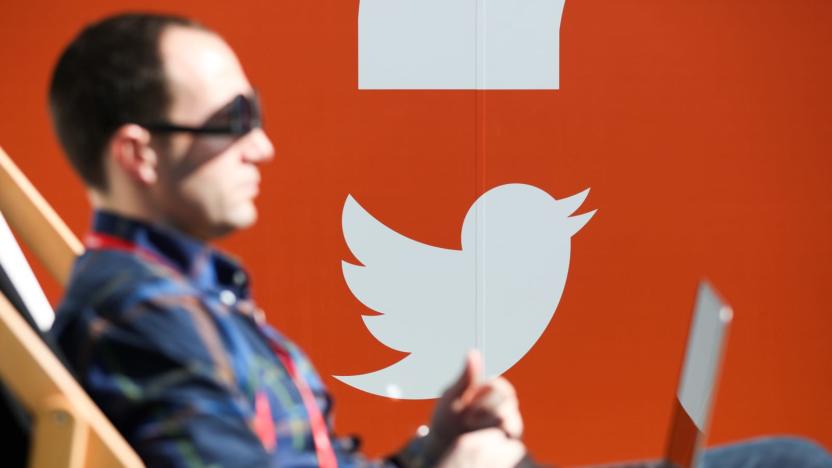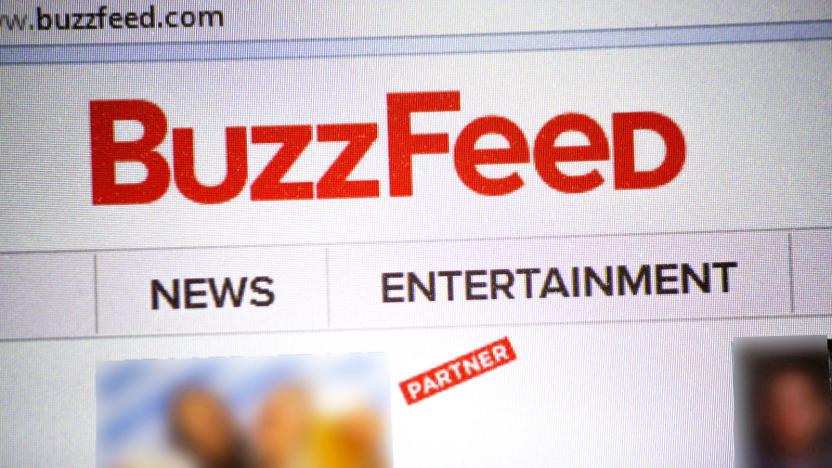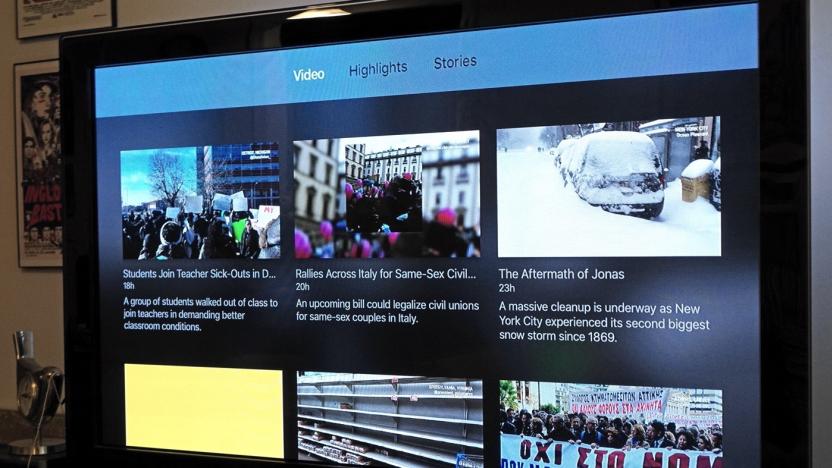journalism
Latest

Twitter triples suspensions of pro-terrorist accounts in one year
If it wasn't already clear that Twitter is serious about stamping out pro-terrorist accounts, it is now. The social network has posted its transparency report for the second half of 2016, which reveals that it suspended over 376,000 accounts for backing terrorism. That's triple the 125,000 it took down one year earlier, and a still-hefty 60 percent more than the 235,000 accounts it pulled in the first half of 2016. While some officials still don't think Twitter is up to snuff (it's not proactively reporting extremist material to police, the UK says), there's no doubt that it's considerably more aggressive.

UK newspapers want Facebook and Google probed over 'fake news'
The UK's newspaper industry is calling on the British government to investigate Google and Facebook's role in the controversial rise of 'fake' news. Responding to an inquiry set up by the Culture, Media and Sport Committee, the News Media Association (NMA), which represents both local and national newspapers, advised MPs to call on both companies for questioning. Grilling representatives in person would, it argued, help ministers to understand how important news is to their business models, and how their algorithms are being manipulated by fake news sites.

All opinions are equal in BuzzFeed's new comment system
President Donald Trump's election win was shocking to many, which seems to say that Americans understand each other less than ever. Part of this disconnect may be a lack of exposure to opposing viewpoints. That's what Buzzfeed seems to think, and it's addressing this problem with something called Outside Your Bubble.

The Engadget Podcast Ep 24: The Biggest Lie
Senior editors Edgar Alvarez and Devindra Hardawar join host Terrence O'Brien to discuss the biggest stories of the week, including Facebook's Journalism Project and the Emoji takeover of Monopoly. Then they'll talk about Volkswagen's massive settlement and pending indictments. Plus they'll try to recap Dieselgate without messing up the timeline.

Facebook's fix for journalism involves digests and subscriptions
Facebook's efforts to mend fences with journalists just got a formal name. The social network just launched the Facebook Journalism Project, an initiative meant to "establish stronger ties" with the news world. The program will have it working with journalists on new business models, offering journo-friendly tools and encouraging everyone to both read critically and fight fake news.

Facebook hires ex-NBC anchor to head news partnerships team
Facebook has hired former CNN and NBC anchor Campbell Brown to head its news partnerships department and help it deal with a spate of recent problems around its news feed. In the newly-created position, Brown will "help news organizations and journalists work more closely and more effectively with Facebook," she wrote on her Facebook page. The social network no doubt helps she can help deal with fake news, strained relations with media companies and other issues.

Twitter test makes Reader mode the default on iOS
For its latest experiment, Twitter has enabled the Apple-built 'Reader' feature by default inside its iOS app. As the Guardian reports, this meanssome, but not all users are seeing simplified web pages when they click on links contained within tweets. The option, which appeared in the mobile version of Safari back in 2011, removes the formatting found on almost any site, giving you a cleaner, arguably more readable layout. The drawback is that you lose the page's visual identity and sometimes, Safari will make a mess of it, giving you a broken or space-riddled article.

Security writer recovers from massive revenge cyberattack
Journalists are no stranger to making enemies bent on retaliation. However, it's becoming increasingly difficult to survive that retaliation in the internet era... just ask security writer Brian Krebs. An unknown party knocked his website offline last week with a massive distributed denial of service attack (620Gbps of non-stop data) as revenge for exposing two major cyberattack sellers who've since been arrested. He's only back online after taking advantage of Alphabet's Project Shield, which protects journalists against censorship-oriented denial of service campaigns. His previous anti-DDoS provider, Akamai, had little choice but to drop him -- the company tells the Boston Globe that a sustained attack on that level would have cost the company "millions."

How a robot wrote for Engadget
John McCarthy, the late computer scientist who first coined the term "artificial intelligence," famously said: "As soon as it works, no one calls it AI any more." What was once cutting-edge AI is now considered standard behavior for computers. As I write this, my computer is continuously performing millions of tasks, caching files, managing RAM and balancing CPU loads. The algorithms behind many of these operations would have been considered AI years ago. Now it's just software. Last year, I looked into how well neural networks -- programs that behave like a scaled-down version of your brain's neurons -- are able to write. My plan was to create a bot that could write articles for Engadget. As I discovered, we're not yet at the point in which such applications can think and write like humans, but they can do a reasonable job of writing readable sentences. As I noted at the time, some companies are using less "advanced" methods to produce content automatically. One such company is Automated Insights, whose tools are used by a number of companies to autogenerate reports, and also by the Associated Press to write articles about sports and finance. I've been using one of Automated Insights' products, Wordsmith, trying again to make a computer write like Engadget. It's easy to argue that Wordsmith isn't AI. It doesn't use machine learning and neural networks, but it does work. And thanks to that fact, I've been much more successful in my mission to automate the art of the tech blog.

ThinkProgress joins Medium's growing list of publications
When Medium shifted its focus from independent writers to a more full-fledged blogging platform earlier this year, it nabbed an impressive lineup of small, but influential sites. Now Medium can boast its biggest addition yet when the liberal site ThinkProgress moves over to the platform next month.

UK tech and gaming magazines are banding together
It's no secret that most magazines are struggling to retain, never mind increase their readership. The medium isn't dead, far from it, but the ever-growing competition online is forcing publishers to rethink what they print. The latest strategy is, unsurprisingly, to create scale through consolidation. Future PLC, the company behind Edge, T3 and MacFormat, as well as the more online-oriented TechRadar and GamesRadar, is now acquiring its fellow magazine maker Imagine Publishing. The deal is worth £14.2 million ($21.1 million) and will be settled entirely through shares.

This is what Kobe's 20-year career in basketball looks like
Information is beautiful, none more so when data is combined with the power of the web to let us visualize the previously unseen. It's one of the reasons why data journalism is so engaging, since it helps show things that you would have otherwise had to trawl through mountains of spreadsheets to understand. This is one such example, the L.A. Times' breakdown of almost every shot Kobe Bryant took during his two-decade tenure with the Los Angeles Lakers. Head on over to the Times' website and you'll be able to delve into the stats, with each type of shot, the game and the distance all included. Oh, except for two shots from the 2012-13 season which got missed by the NBA's shot tracking data. But hey, nobody's perfect.

Medium attracts The Awl and other influential publishers
Medium started as a no-fuss blogging site for passionate writers seeking good design and a larger audience. Over the last three years, however, the platform has slowly expanded and become a home for larger publications too -- both established brands and smaller ones conceived by Medium. Today, the company has announced that a whole slew of small but influential websites are migrating to its platform. These include The Awl, Pacific Standard, Femsplain, The Banana Boat, NewCo Shift and The Bold Italic. Time Inc's Money and Fortune magazines will soon follow.

Blendle brings its pay-per-story news hub to the US
If you've ever thought that it would be wiser to pay a few cents to read a paywalled article than shell out for an expensive subscription, you're about to get your chance. Blendle is launching a US beta for its news aggregation service, which lets you pay to read individual stories from outlets like the Economist, the Financial Times and the Wall Street Journal. Prices start at as little as 9 cents a pop, and you can even ask for an instant refund if you think you've been stiffed. At the moment, the only big catch is that you have to sign up for a waiting list to get in -- you may be twiddling your thumbs for a while.

Fresco News brings its citizen journalism to Apple TV
Now that most of us carry around a camera in our pockets, we're able to provide first-person accounts of breaking news. Fresco News uses iOS and Android apps to source photos and videos from citizen journalists, and now its bringing that content to the Apple TV. Fresco curates all of the coverage it posts and compensates anyone who submits content that's used by news outlets, so you can expect what you see in the app to be worth a look. As far as the Apple TV app goes, content is divided into three main sections: Video, Highlights and Stories.

Experience the Paris vigils using the New York Times' VR app
The New York Times launched its virtual reality news app last month, and in the wake of the Paris attacks last week, it's giving readers a glimpse at the heartbeat of the city. The NYT VR app allows viewers to experience the vigils taking place in Paris, offering people in other parts of the world a look at some of the stories unfolding in the days following the tragic events. While The New York Times' use of VR is still in the early stages, it's already showing its potential. NYT VR provides a platform where readers are better able to relate to events and stories by stepping inside them rather than simply reading about them. "Our mission as journalists is to answer questions," an article accompanying the video explains. "In this case, we sought to answer the question of how a city gathers itself and begins moving forward." If you don't have access to a VR headset, you can watch the interactive piece via 360-degree videos on both Facebook and YouTube. [Image credit: LightRocket via Getty Images]

Google's News Lab helps journalists with their online reporting
Google's efforts to improve internet journalism are going far, far beyond a special YouTube feed. The search firm has officially launched the Google News Lab, an initiative that helps reporters collect and publish news online. The Lab shows journalists how to use Google tools like data visualizers, Maps and Trends. It's also partnering with news outlets on data experiments, fostering media startups and supporting citizen journalism. Google hopes that all these tutorials and team-ups will adapt journalists to the direct, data-driven nature of internet reporting -- and, no doubt, show that the company isn't always at odds with publishers. [Image credit: AP Photo]

Documentarian recreates Trayvon Martin's shooting in VR
The aim of a jury trial is to recreate a moment of history with sufficient detail to let a people decide what the truth is. But unless there's video footage of the event, it can often be difficult to visualize just what went on. It's a puzzle that documentarian and VR pioneer Nonny De la Peña is hoping to tackle with her new project, One Dark Night, a VR app that recreates a crime scene with as much official evidence as possible. Her first subject matter may be disturbing to many, however, as it concerns the controversial shooting of teenager Trayvon Martin.

Reuters TV crams streaming news into your iPhone
Reuters is getting in on the streaming news game, too. With Reuters TV, the outfit's targeting commuters that want to keep up on current events with personalized, on-demand and live content that's downloadable for offline viewing. Reuters promises real-time coverage as well, giving examples like streaming protests in Egypt or presidential speeches from our nation's capitol. Video content will range from 5 - 30 minutes in length and is produced exclusively for the iOS app, drawing from the news organization's some 2,500 journalists on the ground in over 160 countries. Sounds a bit like what the BBC recently did for its app, and this could be great for folks where underground WiFi and cell data isn't available just yet, we'd imagine.

BBC's redesigned news app is all about personalisation
The BBC is one of the most popular news organisations on the planet, yet its BBC News app hasn't seen a redesign since 2010. Realising that a little bit of spring cleaning is in order, the broadcaster has begun rolling out a major update that introduces a fresh new look and deeper customisation options. Readers can now access local news reports for the first time, complimenting the BBC's national coverage, and also choose to follow specific topics that they're interested in. The latter are collected in a section of the app called My News, where users will also be suggested new topics based on what they've been reading recently. While none of these features are particularly new, it shows that the BBC is at least paying close attention to the demand for news curation apps like Flipboard and Circa.








